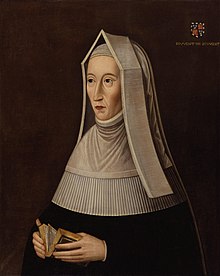|
Margaret Beaufort
Mother of King Henry VII
of England

Margaret
Beaufort was born at Bletshoe in Bedfordshire in
1441 the only daughter and heiress of John
Beuufort, the first Duke of Somerset, grandson
to John of Gaunt, Duke of Lancaster and
great-grandson of Edward III. Her mother was
Margaret Beauchamp. Her father died when she was
only three years old and she was brought up by
her mother with the greatest care and devotion.
While she was very young she was married to
Edmund Tudor, Earl of Richmond, by whom she had
a son named Henry who was to become Henry VII,
king of England .
Edmund died soon after the birth
of their son, leaving Margaret a young widow
with a fifteen week old baby to care for. In
1459 Margaret married Lord Henry Stafford. Lord
Henry was her cousin on both her father and
motherís side, who traced his roots to Henry
III. They were married for 23 years, but had no
children. Her third husband was the Earl of
Derby who died in 1504.
Lady Beufort was a devout woman
and a model of piety and devotion. She was well
known for her benevolence and acts of charity,
though her life was slightly tinged with
asceticism. She rose at five in the morning and
from that hour until around ten oíclock in the
morning she spent her time in prayer and
meditation. In her house she kept constantly
twelve poor people, whom she provided with food
and clothing. She also gave of her self to those
less fortunate. Although she was the mother of
the king, Margaret was often found dressing the
wounds of the lowest beggars and relieving them
by her medicinal skills.
Besides her private acts of
charity and her gifts to religious houses, she
was a generous patron of learning, donating much
money for its encouragement. She established
Readerships in the Divinity at Oxford and
Cambridge . Two public lectures in divinity were
instituted by Lady Beufort, one at both
colleges, and those generous efforts were only
surpassed by her liberality to Godís House at
Cambridge , which was reestablished as Christís
College with her funding. She also provided the
funds for the founding of St. Johnís College .
She was a mother to the students of both
universities and a patroness to all the learned
men of England .
Historians agree that while
applauding her many outstanding qualities and
virtues, there are only a few things to
criticize about her life, which were really only
errors of the age in which she lived. Catholics
not only see the important part she played in
the civil land political history of her time,
but they also perceive her life was a high
example of the Christian life. Her firm and
robust faith bore its natural and wholesome
fruits in deeds of benevolence. Margaret
Beaufort died in 1509.
|